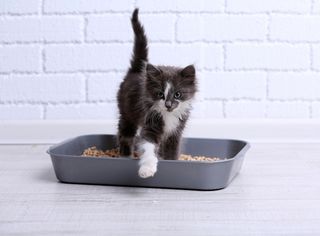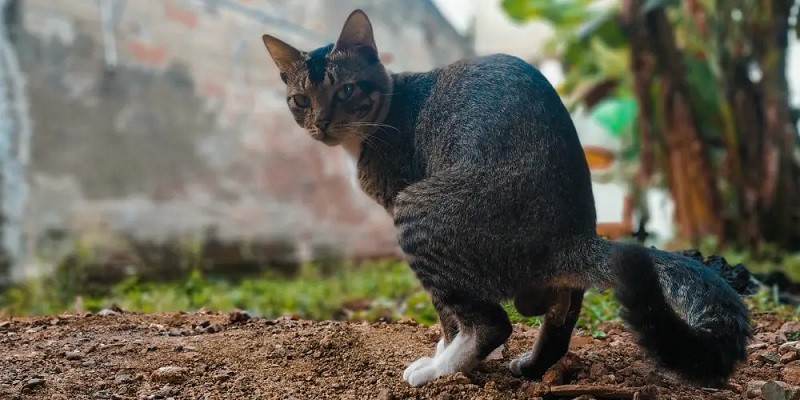Last Updated on January 14, 2025 by Pauline G. Carter
Cats bury their poop to conceal their scent and avoid attracting predators or potential prey. Cats bury their poop for an instinctual reason that dates back to their wild ancestors.
Domestic cats are descendants of wild cats that lived in the desert, where predators and prey were abundant. Burying their poop was a survival strategy to avoid attracting predators (who could track their scent), and to avoid alerting potential prey to their presence.
Additionally, burying their poop helps maintain cleanliness and hygiene and can prevent the spread of disease. Although many domestic cats may not face the same threats as their wild ancestors, the behavior of burying their poop remains ingrained in their instinctual behavior. Understanding why cats bury their poop can help pet owners provide a suitable litter box and encourage proper litter box habits in their feline companions.

Credit: www.livescience.com
Understanding The Instincts Of Domesticated Cats
Cats are fascinating creatures with many unique and mysterious behaviors. One such behavior is their instinct to bury their poop. This peculiar action may seem strange to us humans, but for cats, it is a completely natural behavior.
Explaining The Biological Need For Burying Excrement
When cats bury their poop, it is not simply a matter of cleanliness. It is an innate behavior that stems from their natural instinct to cover up their scent and mark their territory. Here are some key points to help you understand why cats feel the need to bury their feces:
- Covering their scent: By burying their poop, cats are able to mask their odor, which helps them avoid being detected by predators. This instinct has been passed down from their wild ancestors and is an important survival tactic.
- Marking their territory: When cats bury their feces, they are also marking their territory. This is because the scent of their poop acts as a territorial marker, letting other cats know that this area is already claimed.
- Maintaining hygiene: While covering their scent and marking their territory are the primary reasons for burying their feces, maintaining hygiene is also a factor. By burying their poop, cats are able to keep their living area clean and free of potential parasites that may be attracted to their waste.
The behavior of burying their poop goes far beyond just keeping things clean. It is an instinctual behavior that has been passed down from their wild ancestors and is essential for their survival.
Remember, understanding our furry feline friends’ natural instincts is important when it comes to caring for them. By providing a safe and comfortable environment for our cats to live in, we can help them thrive while also respecting their natural behaviors.
Examining A Domestic Cat’S Methods
Cats are known for their fastidious nature, and this includes their toilet habits. Unlike many other animals, domestic cats prefer to bury their poop. This may be due to their instinct to conceal their scent from predators or other cats.
However, this behavior can also cause problems for pet owners, such as odor and cleanliness issues. We’ll examine a domestic cat’s methods and reasons for burying their poop.
Looking At The Physical Act Of Burying
When cats use the litter box, they exhibit a specific behavior when burying their poop. Here’s what you need to know:
- Scratching: Cats use their front paws to scratch at the litter, covering their poop with the litter. This helps to conceal their scent and prevent predators or other cats from realizing they’re nearby.
- Covering: After scratching the litter, cats then use their back paws to cover their poop completely. This not only further obscures their scent but also helps to keep the litter box clean.
- Repeatedly checking: Cats are known to be fastidious creatures, and this behavior extends to their toilet habits. After burying their poop, they may repeatedly check the litter box to ensure that everything is covered and tidy.
This physical act of burying their poop is natural behavior for cats. Domestic cats may have evolved to cover their scent to ensure their safety from predators or other cats.
Reasons For Burying Their Poop
Cats have specific reasons for burying their poop. Some of the reasons are:
- Concealing scent: As mentioned earlier, cats bury their poop to conceal their scent. This is important for cats that are living in the wild, as it helps to keep them safe from predators.
- Keeping the litter box clean: Cats are naturally clean animals, so they may bury their poop to keep the litter box clean. Covering their poop also helps to prevent odor from spreading.
- Marking their territory: While burying their poop, cats may also be marking their territory. Digging in the litter and covering their poop helps to spread their scent in the area.
Burying their poop is a natural instinct for cats. While some pet owners may find it annoying, it’s important to understand that this behavior is normal and necessary for cats. By providing a clean and tidy litter box, you can help to encourage your cat to continue burying their poop and exhibiting their natural behavior.
The Benefits And Potential Concerns Of Cat Burying Practices
Understanding The Role Of Burying To Improve Health And Hygiene
Cats are known for their fastidious nature, often grooming themselves for hours on end. But did you know that they also bury their poop for important health and hygiene reasons? Here are some of the benefits of cat burying practices:
- Reduces odor: By burying their poop, cats remove it from their immediate environment, reducing unpleasant smells and keeping their living space more pleasant for themselves and their human companions.
- Prevents disease transmission: When cats bury their feces, they help prevent the spread of harmful bacteria and parasites that can lurk in poop and potentially cause illness.
- Maintains cleanliness: Burying feces helps keep a cat’s litter box clean and tidy, reducing the risk of bacterial or fungal growth in the box.
- Hides evidence from predators: In the wild, cats bury their poop to avoid attracting the attention of predators that could be lurking nearby.
Possible Issues With Burying
While burying poop is generally a good thing for a cat’s health and hygiene, there are some potential downsides to be aware of, such as:
- Not burying at all: Some cats may refuse to bury their feces, leaving their feces exposed in the litter box. This can cause an unpleasant smell and make the box unappealing to use.
- Over burying: On the other hand, some cats may bury their feces so diligently that they end up digging up the entire litter box, making it difficult to keep the area clean.
- Health problems: If a cat suddenly changes their burying habits or stops burying altogether, it could be a sign of an underlying health issue such as diarrhea, constipation, or urinary tract infection.
- Outside litter box: Occasionally, a cat may even start burying outside the litter box, which can be a sign of territorial marking or anxiety.
While cat burying practices may seem like a simple instinctive behavior, they actually serve important health and hygiene functions. By understanding the benefits and potential concerns of these practices, cat owners can help ensure their furry companions stay happy and healthy.
Frequently Asked Questions Of Why Do Cats Bury Their Poop?
Why Do Cats Bury Their Poop?
Cats bury their poop to hide their scent from predators and other cats.
Is It Bad If A Cat Doesn’T Bury Their Poop?
It’s not necessarily bad, but it may indicate a health problem or litter box issue.
Can Cats Be Trained To Bury Their Poop?
Yes, cats can be trained to bury their poop by providing a clean litter box and positive reinforcement.
Why Do Some Cats Dig Excessively In The Litter Box?
Excessive digging may indicate a health problem or anxiety. Consult your veterinarian for advice.
How Often Should A Litter Box Be Cleaned?
A litter box should be cleaned daily to maintain proper hygiene and prevent unpleasant odors.
Conclusion
Cats are fascinating creatures, and their poop burying behavior is just one of the many intriguing things about them. Although it might seem like a weird habit, it actually serves a significant purpose. Through burying their poop, cats are able to mask their scent and avoid attracting predators or competitors.
Furthermore, it is also a natural instinct that has been passed down through generations of felines. In some cases, a cat’s failure to bury its poop could be an indication of underlying health issues or behavioral problems. Therefore, cat owners should pay close attention to their cats’ poop burying habits and seek medical assistance if necessary.
Overall, understanding why cats bury their poop can help cat owners make informed decisions about their pet’s health and well-being.

